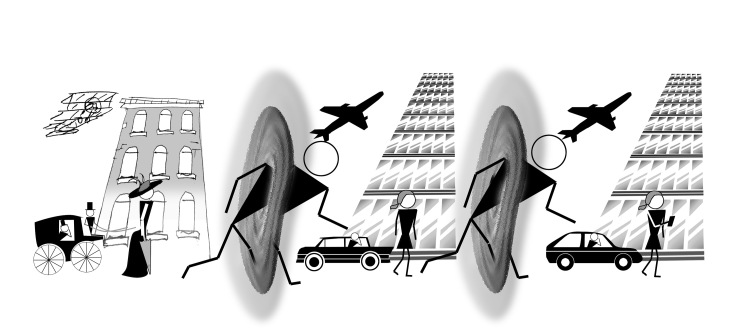Progress is Bunk
Nothing much has changed technologically in the last 50 years. You’re probably thinking that’s a preposterous statement! We daily marvel at face transplants, genome decoding, pictures from Pluto and other scientific miracles while the ‘accelerating rate of progress’ has become a truism. Well, maybe not so much. I’d like to propose that, apart from the computer in your pocket, technological change has effectively stalled for the average person during the last half century.
The time traveling ‘fish-out-of-water’ has been a science fiction trope for 100 years so let’s take a time traveler and see how they might view a century of changes. I’ve appropriated Henry Ford’s ‘history is bunk’ quote for the title so why not appropriate the man himself? Let’s scoop him up just before he introduced the Model T in 1908 and deposit him, as a start, halfway to today.
A half century of change
Dropped into a busy downtown in 1962 the first thing Ford might notice is that most of the young men have inexplicably forgotten to wear their hats and most of the women are clad in hardly more than underwear. Why, even respectable middle-aged women’s skirts risk showing a glimpse of knee! He might be more comfortable checking out the endless stream of colourful cars on the roads and probably be proud to discover that it was his perfecting of the assembly line system that made their proliferation viable (not to mention tens of millions of production line jobs throughout the world). In 1908 most people thought about cars the way we do about private helicopters – impractical toys for the super rich – and had as much idea about how to work them. Even Ford would be a bit disorientated if we put him behind the wheel of a mid-century auto.
He might get a bit dizzy just looking up too. Elisha Otis had invented the elevator and Peter Ellis pioneered steel frame buildings by Ford’s time but brick-fronted 1908 ‘skyscrapers’ rarely went above 15-20 floors. The seemingly topless towers of faceless downtown glass in 1962 would lead his eyes upward where he might spot a passenger jet flying overhead. Maybe it’s a Boeing 707 – a popular mid-range transport in 60’s skies. Ford knows about airplanes of course but for him they’re kites with delusions of grandeur. The concept of one routinely taking 100 people 1000 miles would be pure Jules Verne. Slightly more familiar would be the electric lights flooding the city and the ringing of telephones. Both had started to come into popular use by the time we snatch Ford but he’d probably find the sheer numbers overwhelming. By 1908 less than 10% of households were electrified and the idea of a phone in most homes and on every street corner would be otherworldly (early electrical companies had an uphill struggle against people’s resistance to ‘unnatural’ electric power).
Almost equally alien would be the sound of radios playing from open shop doorways and the windows of TV retailers. Marconi had sent his first wireless transmission across the Atlantic in 1902 and while the idea of wireless transmission of pictures was popularised shortly after, commercial radio didn’t take off till the ‘20’s and TV till the 50’s. Ford probably sat through all 16 minutes of the 1908 blockbuster ‘Jekyll and Hyde’ in his local nickelodeon so he might hightail it into a movie theatre for a sense of familiarity. That year’s hits – Lawrence of Arabia or Dr No – with their sound, colour and semi-nudity would be something of a revelation for him.
By this stage Ford is probably dying of mortification so he could seek out a doctor who might prescribe the century’s miracle drug – antibiotics. Though mortality rates dropped precipitously through Ford’s youth due largely to improving sanitation he still faced a whole range of diseases that stood a good chance of killing or crippling him. It’s hard for us to get into the Russian-roulette mindset of pre-antibiotic life but imagine you could go to your doctor and get a course of pills that cured cancer, heart disease and Alzheimer’s in one go. While he’s there Ford might pick up a leaflet on a medicine of more interest to Mrs. Ford – contraception. Birth control probably doesn’t seem very futuristic now but it was fantastical enough to rate a sidebar in Arthur C. Clarke’s “Childhood’s End” SF novel of the 50’s where reliable, widespread control of fertility was just as far-fetched as the aliens and flying cars. Contraception ushered in the single greatest social change for women since universal suffrage – something else Ford would have trouble getting his head round.

A half century of inertia
Let’s give poor old Ford a little while to settle into the strange, futuristic world of 1962. After he’s acclimatised for a few months we might swoosh him forward to the present day. Pop him onto a modern street and what changes have another half century brought? The cars look sleeker but they’re not flying, hovering or even (for the most part) electric, just the same four-wheeled, internal combustion engined machines he’s familiar with from 50 or even 100 years earlier. He might think electric ignition cool and seat belts restrictive but would have little trouble switching from a 1962 Fairlane to a 2017 Fiesta. Looking around he sees that men’s hair has gotten short again, hats have vanished altogether and he’s having a hard time bumming a cigarette off anyone (a habit he loathed but picked up in ’62 on doctor’s advice). He’s watched Ursula Andress walking out of the waves in that theatre in 1962 and got used to mini-skirts so at least he’s not embarrassed by women’s fashions this time around. The office blocks are still pretty much the same faceless glass towers and looking to the skies he might see a modern 737 or an Airbus. He won’t be able to tell it’s modern of course because they are practically indistinguishable in looks, size, speed or capacity from their counterparts of a half century earlier.
On the medical front, transplants have come on in leaps and bounds while gene editing and stem cells sound groundbreaking. But most people don’t get transplants and he won’t find stem cells in a pharmacy. If he goes to a 2017 doctor it’s probably for the same (though less effective) antibiotics he got in the ‘60’s. That whole women’s suffrage thing is still going too but equal rights for women eliminated sexism the way the abolition of slavery eliminated racism. Ford would find both fights ongoing. Apart from everybody reading their news on glass blocks instead of paper, that would really be about it for day-to-day changes.
The early 20th Century brought cars, planes, electricity, the factory system, movies, radio, TV, democracy, contraception and antibiotics into everyday lives. That cavalcade of advancement ground almost to a standstill somewhere mid century and the most that progress could bring to the average Jane in the latter half of the 20th and early 21st Century were desktop computers and smartphones. Amid decades of over-hyped ‘breakthroughs’ all we actually got were props from some cancelled science fiction show that never made it past the first season. Who knows, maybe this time the ‘next big thing’ really is just around the corner but then, when isn’t it?



